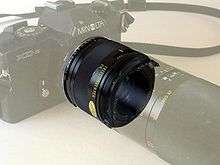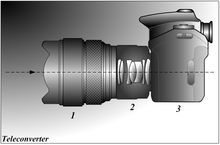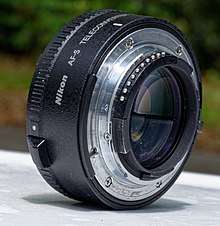Teleconverter
A teleconverter (sometimes called tele extender) is a secondary lens mounted between a camera and a photographic lens which enlarges the central part of an image obtained by the objective lens. A 2× teleconverter for a 35 mm camera would enlarge the central 12×18 mm part of an image to the size of 24×36 mm in the standard 35 mm film format.


Teleconverters are typically made in 1.4×, 1.7×, 2× and 3× variants, with 1.4× and 2× being the most common. A 2× teleconverter effectively doubles the focal length of a given lens. Teleconverters also decrease the intensity of the light that reaches the film plane (or sensor) by the square of its magnification. A 2× teleconverter reduces the light to 1/4, doubles the focal ratio and halves the resolution of an image.
Function
A teleconverter works similarly to a telephoto group of a proper telephoto lens. It consists of a group of lenses which together act as a single diverging lens. The location of a teleconverter is such that the image produced by the objective is located behind the teleconverter in a distance smaller than its focal length. This image is a virtual object of the teleconverter, which is then focused further away and thus enlarged. For example, when a single negative lens is placed so that the image formed by the objective is located in the midpoint between the lens and its focal point, then the lens produces the image in its focal point and enlarging it two-fold, thereby acting as a 2× teleconverter.
When used with somewhat slow lenses they may reduce the effective aperture enough that the camera's autofocus system will no longer work; depending on the camera system, this may range from f/5.6 to f/8.
Dedicated teleconverters only work with a limited number of lenses, usually telephoto lenses made by the same manufacturer, or by a third-party manufacturer to a matching standard.
Using a teleconverter with an existing lens is usually less expensive than acquiring a separate, longer telephoto lens, but as the teleconverter is magnifying the existing image circle, it also magnifies any aberrations. The use of a teleconverter also results in a darker image.
 Camera viewfinder with 300mm telephoto lens.
Camera viewfinder with 300mm telephoto lens. Camera viewfinder with 300mm telephoto lens and 2x teleconverter.
Camera viewfinder with 300mm telephoto lens and 2x teleconverter. A Leica R series doubler, with the female part of in bayonet mount...
A Leica R series doubler, with the female part of in bayonet mount... ...and the male part.
...and the male part. Nikon AF-S teleconverter TC-14E II
Nikon AF-S teleconverter TC-14E II
Teleside converter

A different type of teleconverter called a teleside converter[2] can be mounted on the front of the camera's lens rather than between the primary lens and the camera body. These are popular with users of video cameras and bridge cameras with fixed lenses, as they represent the only way to add more reach to such a camera. They are usually afocal lenses that do not reduce the brightness of the image, but are more likely to add aberrations to the image, independent of the quality of the main lens.
Versus extension tubes
Teleconverters may be confused with extension tubes, a non-optical component designed to increase magnification (at the expense of reduced focal distance).
See also
| Wikimedia Commons has media related to |
- Barlow lens
- Canon Extender EF
- Convertible lens
- Nikon F-mount teleconverter
- Telecompressor